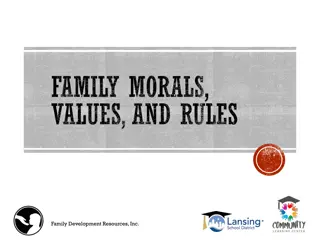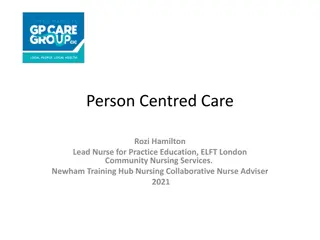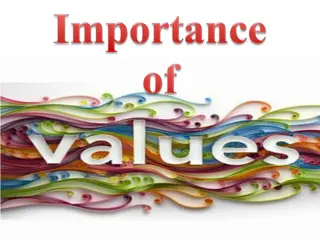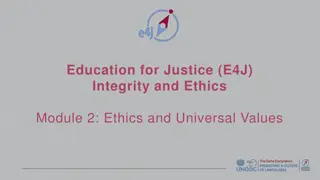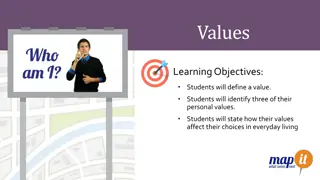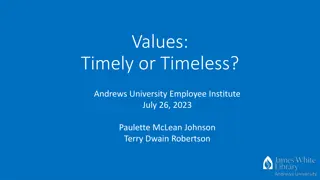Enhancing the 4-H Experience: Values and Opportunities
Explore the essential components of a great 4-H experience, including the values upheld in the Wyoming 4-H Program and the opportunities provided for youth to thrive. Discover how leaders can support youth in goal-setting, skill development, and hands-on learning activities to foster a sense of belonging, independence, generosity, and mastery.
Download Presentation

Please find below an Image/Link to download the presentation.
The content on the website is provided AS IS for your information and personal use only. It may not be sold, licensed, or shared on other websites without obtaining consent from the author.If you encounter any issues during the download, it is possible that the publisher has removed the file from their server.
You are allowed to download the files provided on this website for personal or commercial use, subject to the condition that they are used lawfully. All files are the property of their respective owners.
The content on the website is provided AS IS for your information and personal use only. It may not be sold, licensed, or shared on other websites without obtaining consent from the author.
E N D
Presentation Transcript
What Does A Great 4-H Experience Look like? While you wait please type your name and your county in the chat box. If you are watching the recording of this workshop please contact your local Extension Office to get credit for attending this leader training.
What will we be covering tonight Check out what the 4-H policies say about this topic! Let s hear from the youth! What questions do you want answered. Tips and tricks to make for a great experience. 2
What should leaders provide to youth? The Youth Experience The opportunity to set goals, keep records, and reflect on their learning in a project area. A caring adult to provide the support needed to develop like skills through project work. Opportunities for hands-on learning experiences. A place to publicly display their learning in one or more project areas. Opportunities to use the skills learned in their club and project work at a county, regional, state, national, and international level. 3
What does the Wyoming 4-H Program Value? The Wyoming 4-H Program strives to: Provide opportunities for experiential learning and life skill development through hands-on project work in members areas of interest. Help young people see themselves as unique, resilient, life- long learners who actively participate in their own future, setting personal goals and practicing self-determination. 4
Values Continued Create through projects, activities, and club work a sense of Belonging By providing an inclusive environment that includes social interaction between youth with diverse backgrounds By contributing to team efforts By developing positive relationships with a caring adults Independence By supporting self-directed decision making process that relates to real-life experiences By fostering leadership opportunities Generosity Through involvement in community service activities Through opportunities to share experiences with younger youth members Mastery Through development of specific knowledge and skills with help and guidance from project leaders Through opportunities to learn how to run effective meetings Through understanding of finances gained through access to funds raised by the club. 5
Tell us What do you enjoy most about 4-H? What do 4-H Members think? 6
Tell us What is something that a leader has specifically done to make your 4-H experience fun? What do 4-H Members think? 7
Tell us What do 4-H Members think? What part of 4-H is most frustrating to you? 8
Tell us If you were to share something with a new member / parent / family what advice would you give them that you wish someone would have told you? What do 4-H Members think? 9
Questions? What did you hear that you want to know more about? What other questions do you have for these 4-H members? 10
Lets Make it Happen! Tips and Tricks for a Fun Experience
Belonging GET TO KNOW THE KIDS! Have adults interview kid and kids interview adults and introduce each other. Play Get to know you games Have You Ever Congruent Circles Show and Tell Families 12
Focus on Engagement! What do you think are important parts of club and project meetings? Ask for help use and highlight resources in your club. 13
Share what you know Have members talk about what they are doing. Encourage travel and engagement with other counties, states, etc. Provide support dollars Invite in people who have gone beyond the club and county to talk Help with sign ups or other confusing concepts. 14
Some of the things weve learned are that youth thriving is dependent on having high quality 4-H programs where youth feel like they belong and have relationships with supportive adults. We also know that thriving youth achieve important developmental outcomes, like personal responsibility, academic motivation, confidence, and high personal standards. -Mary Arnold, Oregon State University 15
Program Quality Principles Physical and psychological safety. Appropriate structure. Supportive relationships. Opportunities to belong. Positive social norms. Support for efficacy and mattering. Opportunities for skill building. Integration of family, school and community. 18
THEY NEED YOU! To help them. To care. To pay attention. To share. To listen. They just need you to be present! 20
Questions or Comments?





